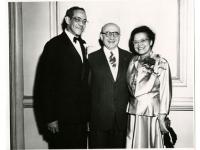My task as a volunteer in digital collections is to add metadata to images posted in “Questions of the Week.” As a historian by training, my metadata interests lean toward the descriptive. What was the purpose of this photograph showing the Honorable Raymond Pace Alexander (1898-1974) and his wife Dr. Sadie Tanner Mosell Alexander (1898-1989), flanking business and civic leader Albert M. Greenfield (1887-1967)? While I could not identify the event, I did uncover what was probably one of the earliest associations of Alexander and Greenfield. Their interaction, however, was merely a footnote to a remarkable story about the first low income housing project in Philadelphia to be developed privately by an African American couple.
In 1939, Pearl and Benjamin Mason lived with their two children in a tiny house with no bathroom in South Philadelphia. For the past four years, this African American family survived on a weekly allowance of $11.80, afforded through the federal government’s relief program. At one time a garage attendant, Benjamin had been unemployed for seven years. On March 24, 1939, the Masons’ lives changed dramatically when a horse named Workman won the Grand National in Liverpool, England—a race that determined the winners of the widely popular Irish Sweepstakes. The Masons held one of the winning sweepstake tickets, turning their $2.50 investment into a $150,000 windfall.
The Masons received national media attention not just for winning, but for how they spent their winnings. First, they reimbursed the Department of Welfare $2,133.90, the amount they had received on relief. They paid off other debts and spent another $3,000 on a house in North Philadelphia for their family and a car. Acting on the advice of Raymond Pace Alexander, the Masons spent the remaining $90,000 to buy and renovate a block of 28 dilapidated houses at 20th and Lombard streets. At that time, Alexander was one of only thirteen blacks practicing law in Philadelphia. He specialized in desegregation cases. The property the Masons purchased bordered on the Rittenhouse Square vicinity, which even then was considered a “ritzy and exclusive white section” of the city. According to a December 1939 article in the Afro-American, the real estate concern of Albert Greenfield and Company was also interested in the transaction.
The Masons stipulated that at least 75% of the work be done by “colored workmen.” The project nearly died during construction when a bank sought to renege on its financing promise. According to a 1992 news article, Alexander “saved the day by putting up his property to guarantee a second loan.” Named after the Masons’ daughter, Frances Plaza opened in 1941 offering 50 apartments for rent to low-income black families along with an open courtyard and playground. Rents ranged from $30 to $39. In one year, Frances Plaza was fully occupied with a long waiting list. The Masons responded in a most unbusinesslike fashion and cut rents by 10 percent.
The Masons sold Frances Plaza to an investor in 1958. In its stead today are the Waverly Court Apartments. Other than their affiliation with the Holy Trinity Baptist Church on Bainbridge Street, little else is known of what became of Pearl (born circa 1900 in North Carolina), her husband Benjamin (born circa 1897 in South Carolina) and their son Benjamin Jr. Their daughter Frances studied music at Howard University in Washington and became a singer.

